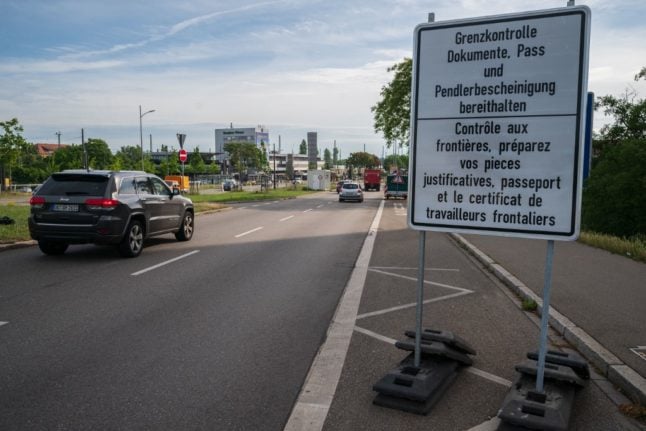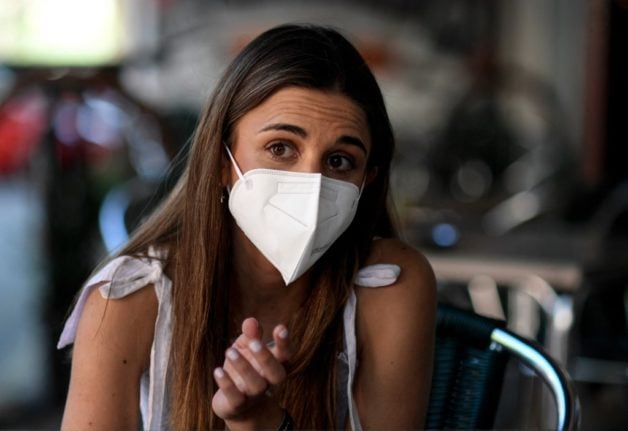German Chancellor Angela Merkel announced on Thursday her intention to hold talks with Switzerland on possible controls at their common border to prevent the spread of Covid-19 or its mutations.
Until now, cross-border commuters are still circulating normally between the two countries.
But the concern over contaminations with the mutated strains could be a game-changer.
“We will certainly have to discuss this with Switzerland,” Merkel told a press conference in Berlin.
EXPLAINED: Which countries are currently on Switzerland's quarantine list?
She added that “we will try to avoid” imposing general restrictions on travel between the two nations.
On December 23rd, the German state of Baden-Württemberg, which shares a border with northern Switzerland, restricted traffic between the two countries to prevent the spread of coronavirus.
The primary goal was to prevent seasonal shopping tourism from Switzerland.
However, quarantine-free entry is permitted for a stay of up to 24 hours for work, official business, school, medical, or family-related reasons.
Nearly 34,000 cross-border workers from Germany are employed Switzerland, mostly in the Basel area.
Germans are allowed to come to Switzerland, but if they are residents of Land Sachsen and Land Thüringen they will have to quarantine for 10 days if they arrive after February 1st.
Stopping the spread of coronavirus is a concern at Switzerland’s other borders as well.
Italy
Earlier this week, Ticino officials asked the government to reintroduce checks at the Swiss-Italian border.
READ MORE: Ticino officials ask government to reintroduce checks at Swiss-Italian border
Concerned that people entering the canton from Italy will spread the new Covid variant, the canton’s officials asked the Federal Council “to introduce systematic controls at the border and to close minor crossings, except for the crossings most used by health sector workers”.
About 70,000 workers from Italy commute each day to their jobs in Ticino, but authorities said “the significant cross-border flow appears only partially linked to professional reasons”.
While people from Italian regions closest to Switzerland — Lombardia and Piemonte — can enter freely, those living in Regione Emilia Romagna, Regione Friuli Venezia Giulia, and Regione Veneto will have to quarantine for 10 days from February 1st, due to the high number of Covid infections in those areas.
READ MORE: UPDATE: Switzerland to add more neighbouring countries to quarantine list
To enter Italy from Switzerland, a declaration form is needed to explain reasons for travel.
However, border workers returning to Italy from their jobs in Switzerland are exempted from the obligation to carry the form.
France
New rules are in effect on Switzerland’s border with France.
On the Swiss side, arrivals from Région Provence-Alpes-Côte d'Azur will have to quarantine for 10 days starting on February 1st.
And anyone wishing to enter France from Sunday will need a negative Covid test, performed in the previous 72 hours. The government specified that this must be a PCR test, as the rapid-result antigen test will not be accepted.
Cross-border workers are exempted from this requirement.
Also, as new curfew rules are currently in effect in France, you must carry this document if you cross the border between 6 pm and 6 am.
More than 125,000 cross-border workers from France who are employed is the area around Lake Geneva are exempted from this requirement.
Austria
From January 15th, everyone arriving in Austria, including people from Switzerland, have to register by filling out this form.
Additionally, Austria requires a 10-day quarantine upon arrival.
There are, however, some exemptions, including cross-borders workers, as well as people who visit their partners in Austria more than once a month.
Those who have a serious emergency to attend to, including serious illnesses, deaths, funerals, births and the care of people in need of support, along with diplomats and medical escorts, are also excused from the quarantine requirement.
In general, Austrian residents don’t have to quarantine when entering Switzerland. The only exceptions are arrivals from Land Salzburg, who will be required to quarantine for 10 days from February 1st.




 Please whitelist us to continue reading.
Please whitelist us to continue reading.
Member comments